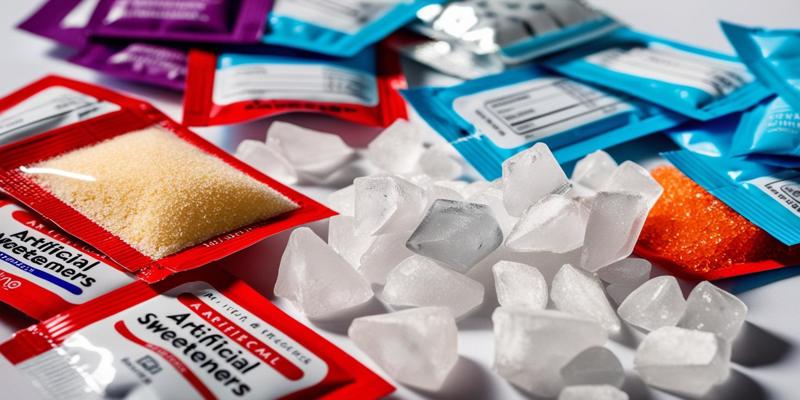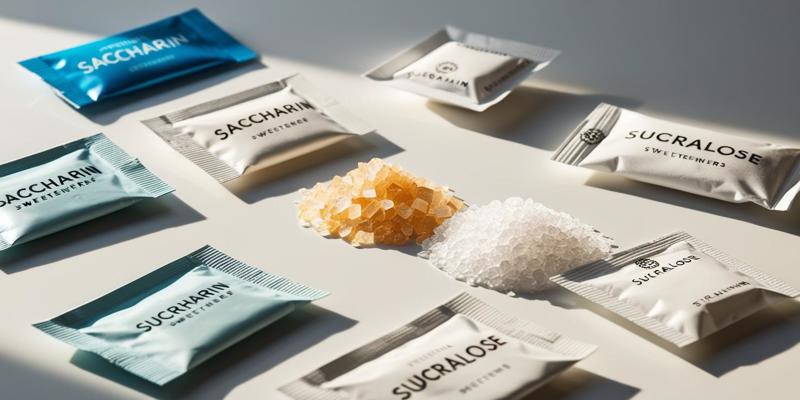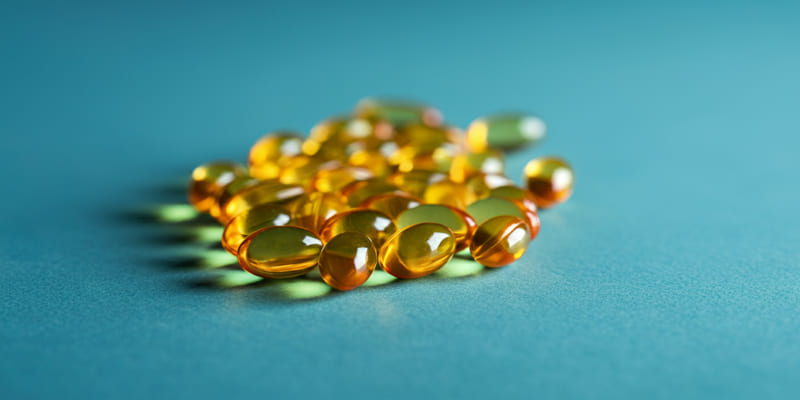Would you want to substitute sugar in your diet with an artificial sweetener? Even though the alternative sounds so healthily low-calorie, the truth is a bit different. One needs to understand their promises and pitfalls to make the right choice in using sugar substitutes. In this in-depth explainer, take a closer look at the science behind low-calorie sweeteners, how they impact your body's functions, and whether it finally means guilt-free sweet pleasures.
Understanding Artificial Sweeteners: What Are They and How Do They Work?
 Artificial sweeteners are synthetic sugar substitutes that provide sweetness and sans traditional sugar's calories. These compounds give the taste of sugar with very little or no nutritional value. At this point in our journey through artificial sweeteners, knowing what they are and how they function within our diets is relevant.
Artificial sweeteners are synthetic sugar substitutes that provide sweetness and sans traditional sugar's calories. These compounds give the taste of sugar with very little or no nutritional value. At this point in our journey through artificial sweeteners, knowing what they are and how they function within our diets is relevant.
Types of Artificial Sweeteners
Some of the popular artificial sweeteners currently approved by the FDA are Aspartame, Sucrose, Saccharin, Acesulfame potassium, commonly referred to as Ace-K, and Neotame. Each of these sweeteners has a different chemical makeup that allows it to interact with our taste receptors and produce the sensation of sweetness without containing sugar calories.
The Science Behind Sweetness
Artificial sweeteners work by attaching to the sweet taste receptors on the surface of our tongues. These are proteins that, when a sugar molecule comes into contact, send signals into the brain interpreted as sweetness. The distinguishing feature of artificial sweeteners is that they can stimulate these receptors much more strongly than sugar does. For this reason, many artificial sweeteners are hundreds of times sweeter than sucrose.
Metabolic Effects
Unlike sugar, which is digested for energy, most artificial sweeteners are not digested in the body. This makes them non-caloric, but it also means they provide no energy or nutritional value.
The Health Effects of Artificial Sweeteners: Debating the Benefits and Risks
 The other major factor in sugar alternatives is artificial sweeteners. When opting for them, one needs to consider their health effects. Along with benefits, there will also be potential drawbacks that require proper consideration.
The other major factor in sugar alternatives is artificial sweeteners. When opting for them, one needs to consider their health effects. Along with benefits, there will also be potential drawbacks that require proper consideration.
Potential Benefits
Artificial sweeteners can also help manage body weight. Because they have almost negligible calories, they reduce intake when used in place of sugar. This could be very useful for those suffering from obesity or those trying to maintain their body weight.
Additionally, sweeteners do not affect blood sugar levels, which is one of the primary reasons many diabetic or blood sugar-regulating individuals prefer their usage. They can give a person sweetness without the same glycemic effect regular sugar would cause.
Potential Issues
However, artificial sweeteners are generally contentious despite their benefits. Some studies have found that they can change the gut bacteria to cause glucose intolerance and metabolic changes, but this aspect needs further investigation for a complete understanding.
There is also ongoing debate over whether artificial sweeteners enhance cravings for sweet foods. Some researchers theorize that the intense sweetness of these substances could overstimulate sugar receptors, potentially leading to increased appetite and sugar cravings.
Long-term health effects are another concern. While the accepted artificial sweeteners have been deemed safe for use by regulatory bodies, some health professionals suggest moderation due to the need for broader and longer-term studies.
Artificial Sweeteners vs Sugar: Which is Healthier?
When it comes to sweetening your food and drinks, one may wonder if using artificial sweeteners or old-school sugar is healthier. Here, we will discuss the essential differences and possible effects of the above choices.
Caloric Content
Another positive contributory characteristic of artificial sweeteners is their makeup's low composition or complete absence of calories. As regular sugar is estimated to have roughly four calories in every gram of the substance, most artificial sweeteners contain either no or almost no calories; as such, they are one of the mainstays of any attempt at keeping calorie intake at a minimum or body weight within reasonable limits.
Impact on Blood Sugar
Unlike sugar, which causes rapid peaks in blood glucose, artificial sweeteners generally do not affect blood sugar. This quality makes them appealing to people with diabetes and those who pay close attention to their blood sugar levels. However, recent research suggests that artificial sweeteners may affect insulin response complexly, which warrants further investigation.
Dental Health
However, artificial sweeteners have a clear advantage when it comes to teeth. Sugar is viewed as a key contributor to tooth decay because bacteria in the mouth convert it into acids that dissolve the enamel on the teeth. Artificial sweeteners don't contribute to this process and could decrease the occurrence of dental disease.
Possible Health Issues
Artificial sweeteners, by and large, are considered harmless by regulatory bodies, even as long-term health effects have raised concerns. For example, some studies have claimed that artificial sweeteners may be linked to changes in gut bacteria, an increased craving for sweet food, and even a possible impact on metabolism. Research is still ongoing in all these areas, and no hard conclusions have been arrived at.
Making Sense of Artificial Sweeteners: A Consumer's Guide
Artificial sweeteners have gained momentum as people are increasingly looking for healthier options for sugar. However, sorting out this maze can be somewhat puzzling. The following guidelines should help people make intelligent choices about using artificial sweeteners in their diet.
Understand the Variations
Familiarize yourself with the types of artificial sweeteners. Examples of common ones are aspartame, sucralose, stevia, and monk fruit extract. All these have different properties and may affect health in particular ways; hence, the need for individual research.
Consider Your Health Goals
Consider why you're using artificial sweeteners. Are you trying to manage diabetes, lose weight, or cut your sugar intake? For your specific health goals, one sweetener might be better than another.
Pay Attention to Portion Sizes
Although artificial sweeteners may be calorie-free, they can have health consequences in excess. Practice moderation and pay attention to serving size. Just because a product contains artificial sweeteners does not mean it is healthy.
Read Labels Carefully
Always read nutrition labels and ingredient lists carefully when purchasing foods and drinks containing artificial sweeteners. Foods labeled "sugar-free" may include other carbohydrates or unhealthy ingredients. Be very wary of "diet" or "light" foods and drinks, as they can be just as bad for your diet as foods containing sugar.
For this reason, you should consult a healthcare provider or a registered dietitian before adding artificial sweeteners to your diet if you have any health conditions or concerns. They can advise based on your health needs and help you make the most appropriate choices.
Conclusion
In the end, while artificial sweeteners may be an alluring alternative to sugar, the evidence concerning their health effects in the long term needs to be clarified. It would be helpful if you handled these substitutes cautiously and in moderation. The key is to eat whole, unprocessed foods and educate your taste buds to like less sweetness over time. Make informed choices about using sweeteners and a balanced diet that will enable you to take responsibility for your health toward sustainable changes for the best.











